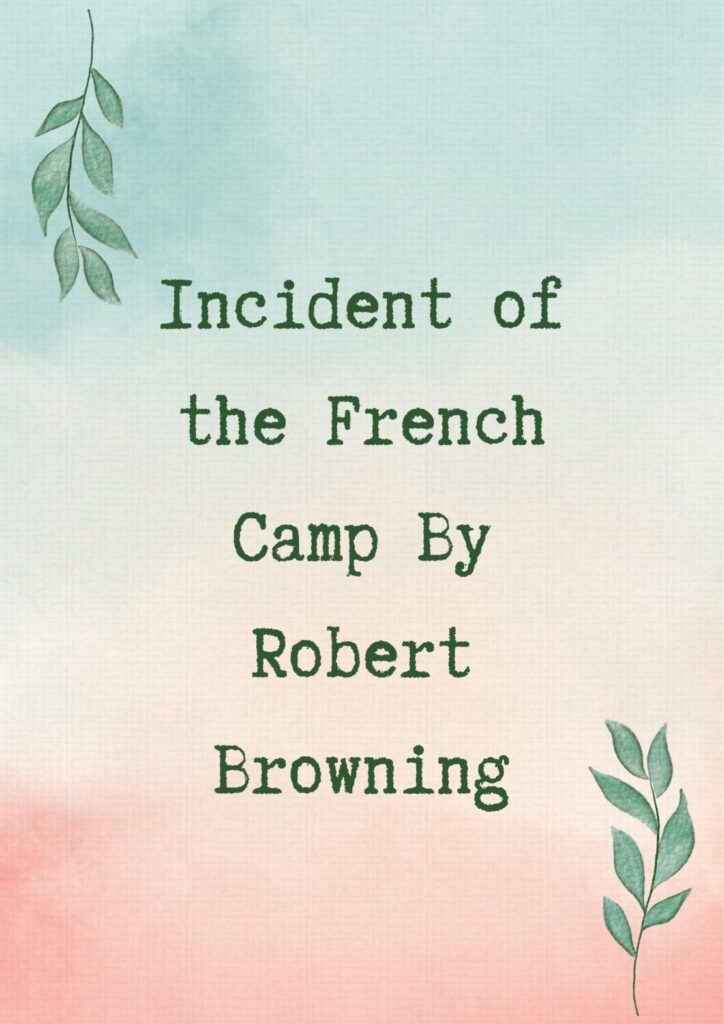Explore the summary of Incident of the French Camp by Robert Browning — a powerful poem showcasing bravery, sacrifice, and patriotism during the Napoleonic Wars.
Incident of the French Camp Poem Summary By Robert Browning

BUY ROBERT BROWNING FAMOUS POEMS BOOK ON AMAZON
Summary of Incident of the French Camp By Robert Browning
Introduction
“Incident of the French Camp” is an inspirational English poem written by British poet Robert Browning. The poem is inspired by a true incident that happened during the time of Napoleon Bonaparte.
The poem tells the story of a brave soldier who followed his duty till his last breath and smiled with pride even while dying. The poem is short, but its message is very big — “Duty is above all, even life.”
Main Characters
The young French soldier – the hero of the story, who gave the message of victory even in his last breath after conquering the enemy’s fort.
Napoleon Bonaparte – the great emperor of France, who is standing in his camp during the war and monitoring the events.
Summary of the poem in detail
War scene
The poem begins with a serious war-situation. The French army attacks the fort of their enemies in the darkness of the night. This fort was under the control of enemy soldiers and conquering it was considered a great achievement.
Napoleon, who was the leader of the French army at that time, was standing in his camp built at some distance from the battle site and assessing the direction and outcome of the war.
He is worried — will the army win? Will his strategy succeed?
Arrival of the soldier
Meanwhile, a young soldier comes towards the emperor at lightning speed on a horse. There is no panic on his face, but confidence and enthusiasm.
His dress is stained with dust and blood, but pride is shining in his eyes.
Message of victory
The soldier stands directly in front of Napoleon and says:
“Emperor, we have won that fort! The enemy has been conquered!”
Hearing this, Napoleon smiles. But then he notices the condition of the soldier — he has a deep wound on his chest, his clothes are soaked in blood.
Emperor’s question
Napoleon asks emotionally:
“Are you hurt?”
But the soldier does not show any pain. He only shakes his head slightly and says:
“Yes, but I came to give this news. Everything else later.”
This meant — “I knew I was going to die, but I did not want to die until I gave you this happiness.”
Martyrdom
After saying this, the soldier smiles, composes himself, and then falls right there in front of the emperor. He dies.
But that death was not defeat — it was the brightest form of victory. He remained loyal to his country, his army and his emperor till his last breath.
Main themes and deep meanings
1. Sense of Duty:
The soldier knew that his condition was serious, but he wanted to fulfill his duty first. The greatest religion for a soldier is to live and die for the country and the emperor.
2. Bravery and Pride:
The smile of the soldier in the poem shows that he is not sad about his sacrifice, but he is proud that he brought victory. He feels pride even in pain.
3. Patriotism:
His aim was not just to give a message, but to show that every sacrifice made for the country is immortal.
4. Human image of Napoleon:
In the poem, Napoleon is presented not just as an emperor but as a sensitive leader, who is overwhelmed by the bravery of his soldier.
Emotional side of the poem
This poem has everything that can touch one’s heart –
A young soldier, who is probably just 18-20 years old,
Who knows that he is dying,
But he is not afraid even at that moment, but fights with pride.
His smile does not tell that he is in pain, but it tells that he lived life purposefully.
While reading this poem, a scene automatically forms in the eyes of the reader – the wounded soldier, the horse running, the emotions in Napoleon’s eyes, and the national pride rising in the last moment.
Conclusion
“Incident of the French Camp” is a small poem, but it contains a vast ocean of emotions and messages.
This poem teaches us:
That patriotism does not mean just fighting a war,
but also fulfilling one’s responsibility, being proud of one’s nation, and
devoting one’s life to a greater cause.
This soldier stood for his emperor and country until his last breath — without complaint, without fear.
Last lines
“He came to give the news of victory,
He hid the pain of death.
He fell smiling on the battlefield,
He was not a soldier — he created history.”